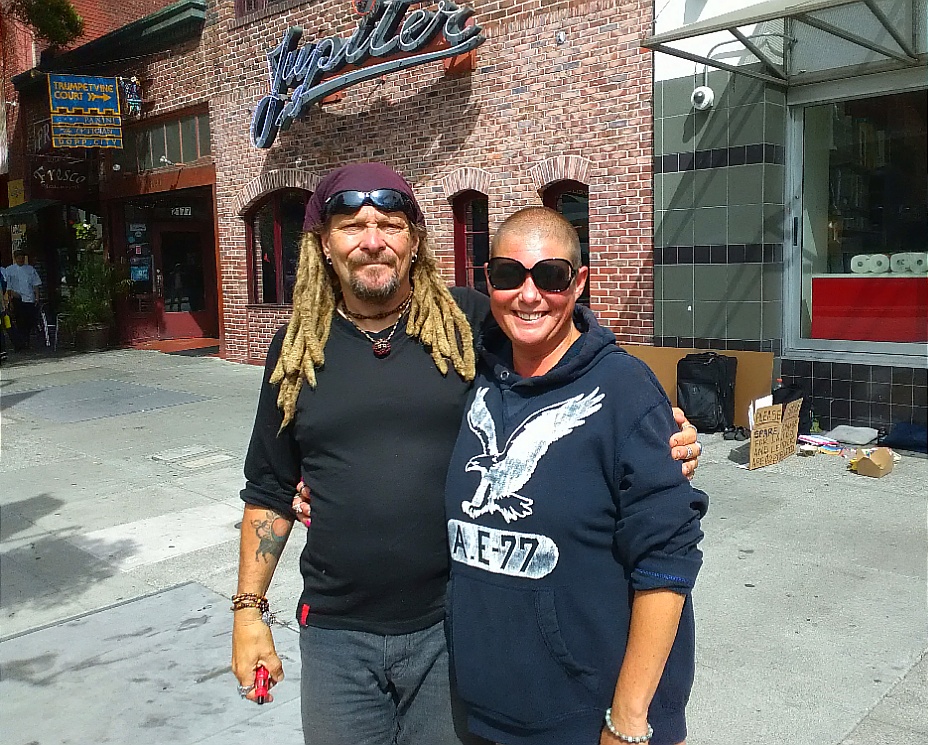I would like to tell you about a friend I met while living on the streets of Berkeley, approximately three years ago. Her name was Michelle Marie Larson. When I met her, she was working on the sidewalk, collecting change, in front of the Dollar Tree on Shattuck Avenue. Michelle was in her mid-forties, with blonde hair and a slim build. I found out later that she was a mother of three boys. She was a very giving person even though she had been hardened by three years of living on the streets.

Michelle is what I would call “real,” meaning if she likes you she would invite you to sit down and smoke a bowl and chat for a while, which is what we did together on many occasions. But if she didn’t like you, she would tell you to get the Hell away from her in a loud, clear voice.
On October 4, 2018, Michelle was found dead. Years of living on the streets had taken a toll on her, and I could see that it was wearing her down bit by bit, piece by piece.
Living on the streets is so much harder for a woman than it is a man—the cowards try to bully and harass women and in some cases, rape them. However as the years went by, Michelle never complained. Just the opposite, she always had a big smile on her face, and laughed all the time. I believe that when a person knows real pain with a depth most people never experience, their defense mechanism is to try to make everyone around them happy.
There are only a few of us that she would let into her world to know how and what was really going on. Michelle applied for housing several times, through federal funding as well as state and county assistance, but unfortunately her requests seemed to fall on deaf ears. She was becoming very depressed, with a sense of no self-value. Her depression and anxiety were justified and understandable: The snide looks, smart-ass comments, the feeling of invisibility that she endured on most days would wear on anyone. Trust me when I say, this type of depression is commonplace for many of those who have had the unfortunate experience of living on the streets. You must experience these emotions first-hand in order to have a full understanding of them.
She had a hard life and fought for everything she accomplished, inch by inch.
Michelle wasn’t running up the fine citizens’ tax dollars. She was surviving on her own, not asking anyone for anything, with the exception of her EBT card. Each month when the EBT card was filled, Michelle would freely hand it out to many of the people she knew, including myself. She would tell us to get whatever we needed, without hesitation.
Just three years before her death, Michelle had a job, an apartment, a car, and was living what some might call the American Dream. But in 2015, somehow that all came to an end. I never did
find out what sent her to the streets. Michelle, like many of us, did not talk about the past. It’s gone and never coming back, so there’s no reason to bring it into the present.
Michelle never told her sons that she was living on the streets. Many people, especially women, do not want their families to know. But Michelle did confide in me, laughing one minute and then trying to hold back tears just seconds later.

Recently, she spoke with me about not being able to take the hardships of living on the streets anymore. I did not see it at the time, but she was saying goodbye to the few people she considered friends. The next day we sat for awhile and once again Michelle spoke to me about how her soul was worn thin and her body completely exhausted.
I urged Michelle to check herself in the hospital and take a break for a while, get off the streets and get some much-needed rest. But that just wasn’t Michelle’s style. She had a hard life and fought for everything she accomplished, inch by inch.
She gave me a big hug and then made an off-handed remark of how I saved her life that day. That was on a Tuesday afternoon. Just two days later on Thursday, October 4, Michelle’s body was reported laying on the sidewalk. Michelle overdosed on opiates. As far as we know, she took her own life.
In the days that followed, I spoke with several people that had been around her campsite the night before Michelle’s death. I was told that she was not in her tent but was laying on the sidewalk curb halfway in a parking spot and halfway on the sidewalk. It is my understanding that she was laying there from 8:30 p.m. Wednesday night until 6:00 a.m. Thursday morning, when a passerby finally called the police.
It is a truly sad fact that someone could lay in that position for hours and not one person stepped up to check in on her or call the police. Instead, people just looked at her and stepped around her body, making comments about her lying there on the sidewalk.
When you live on the streets you were will learn this hard truth: If people don’t care about you when you’re living, they certainly will not care about you when you’re dead.
The articles in the local newspaper certainly shed light on this fact. The only article I found about her death was listed in Berkeleyside. It read: “Homeless woman in her mid-40s found dead on Shattuck and Dwight.” This was the summary of her life. Over 40 years on this Earth, raised three boys, and her name isn’t even listed, nor was she listed in any of the obituaries. The next two statements were traffic updates, about when the roads would open again. I guess the traffic was more important than this woman’s life.
The streets are hard; not apologetic, and not politically correct. If you live on the streets you are considered trash, and when you die the city sweeps you up and disposes of you as quickly and quietly as possible.
There is a part of me that thinks, “Wow you did it. What’s it like, is the pain gone?” These are questions I will ask myself until it is my death. I feel quite confident it will be summed up in the same manner:
“Homeless man dies on the streets.”
Timothy Busby is a homeless writer who lives in Berkeley. He writes from his past five years of experiences while living on the streets from New Orleans to Berkeley, and many cities in between.
